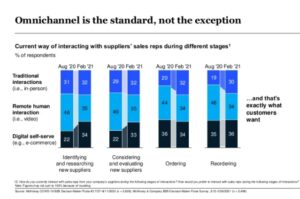How to Improve Your Media Sales Strategy: 3 Best Practices Worth Considering
Over the last two decades, technology has radically altered the nature of media sales, moving content first from the printed page to the monitor and then from the monitor to the smartphone. However, until recently, most businesses set the pace of their digital transformations for themselves. Covid-19 changed that for approximately 97% of businesses.
With many pandemic era practices set to remain in place for the foreseeable future, it may be time to reevaluate your media sales strategy and reconsider what best practices will look like in a workspace defined more by FaceTime than face-to-face lunch meetings.
In this guide, you’ll gain a better understanding of three critical areas of focus for media sales strategies in 2022.
Media Sales Essentials in the Digital Transformation
The world is changing quickly. The way that you sell your products and services has changed. You need to understand what your customers are looking for and how to get your message across to them to survive. Companies of all sizes and industries can improve their media sales strategies by focusing on these three key areas:
- Adapting to Omnichannel Communication
In a world where two-thirds of B2B buyers prefer remote human interaction or digital self-service to traditional face-to-face meetings, omnichannel has become the standard means of delivering to buyers what they want quickly and effectively.
With pure-play digital ad buy-up by a record-setting 37% in 2021, there’s no shortage of new territory for media sales teams to conquer. However, the data suggests that the lion’s share of new sales will go to sales teams who can provide service seamlessly across a range of communication channels. These channels will vary from buyer to buyer and from day to day for the same buyer.
Far from being an inferior runner-up to sit-down meetings, mobile communication through calls, texts, and cloud service platforms now more reliably delivers to buyers what they want and on their terms. This doesn’t mean that buyers no longer value personalized service. Instead, now that they have options, they prefer to choose the medium of interaction themselves.
At the same time, adapting to omnichannel doesn’t just benefit buyers and customers. The more sales teams incorporate it as a preferred, long-term means of communication, the more businesses can reduce unnecessary travel expenses and other inefficiencies of maintaining geographic sales territories.
- New Types of Media Matter to the Message
Effective omnichannel communication also includes communicating with buyers and customers through emerging media preference trends. The last decade has taught us that these trends change rapidly, sometimes involving entirely unprecedented innovations in platforms like virtual reality. Other times, users experience a rebirth of interest in a simple, familiar medium such as audio.
Based on the data from 2021, here are the media trends to take advantage of in 2022:
- Video: 94% of video marketers report that video content now reliably improves customer understanding of products and services.
- Podcasts: In the US alone, podcast consumption rose 25% last year to a combined total of 15 billion hours.
- Shoppable Posts: Social media users prefer the whole of their experience delivered in one app as seamlessly as possible, and the big names of social media – Instagram, Facebook, Pinterest, and others – have all introduced shoppable posts in their platforms that allow companies and brands to conduct sales in-platform.
Virtual Reality: More than doubling since 2017, the number of monthly virtual and augmented reality users now top 85 million, and this growth rate appears set to only increase over the next few years.
In the new digital ad market, an effective sales strategy will incorporate new types of media both as a means of communicating with buyers and as the deliverables themselves. There’s a vast potential for growth in media sales for businesses willing to move into these new digital spaces.
This strategy scales to the individual as well. Salespeople who want to improve their performance in this environment can augment their traditional relationship-building skills with technical savvy across emerging media. Want to prove that you’re up to the challenge of bringing in new business to a potential employer? Demonstrate an up-to-date understanding of user trends and provide an actionable plan to meet those needs.
- Mitigating Uncertainty with Variable Cost Strategies
The workspace has been permanently reshaped in just two years. The networking and relationship skills that have always been essential to successful selling have been completely reimagined in an expanding digital landscape. Not only has the way business is conducted changed, but it will continue to do so in fundamentally unpredictable ways.
In this context, the risk of carrying fixed costs only goes up over time. If your business continues to struggle with the question of what to pay salespeople, the long-term solution may come from third-party organizations. Customer relationship management (CRM) platforms and the managed services providers who support them can offer many businesses a twofold advantage when it comes to your sales strategy.
First, you can get out from under the burden of underperforming fixed costs and start reliably getting what you pay for in sales performance.
More importantly, third-party agencies can provide your business with affordable expertise in essential services. Cloud-based services have become integral to providing the kind of instant digital experience consumers now universally expect. In response, cloud CRM providers have expanded their catalogs to include solutions in specialized fields such as media ad sales.
Partner with Rainmaker to Forge Your New Media Sales Strategy
Planning the right media sales strategy during this period of accelerated digital transformation requires experience and expertise across an increasingly complex array of platforms. At Rainmaker, our team of experts is capable of tailoring Salesforce Cloud services to meet your business needs.
To learn more about Salesforce Managed Services with Rainmaker, contact us here.








